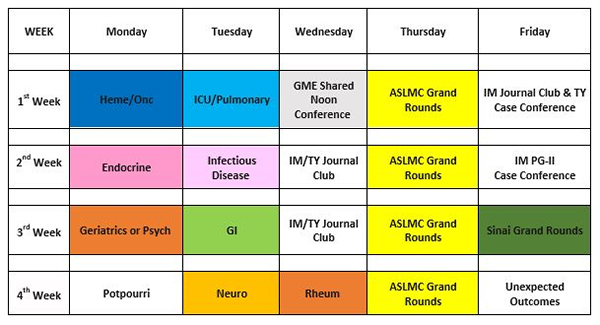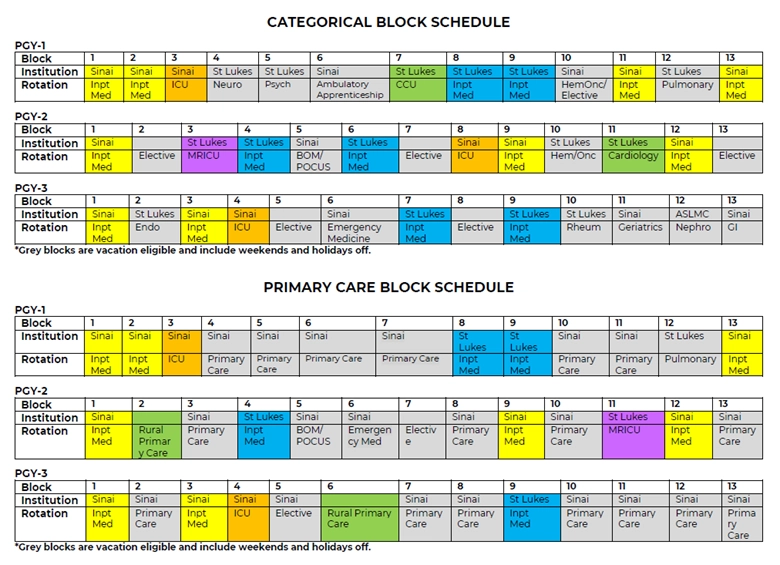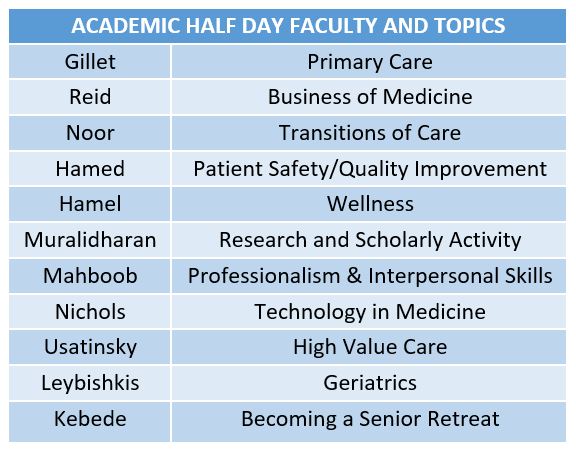Internal Medicine Residency
Contact usThe Aurora Health Care Internal Medicine Residency is a preeminent university-affiliated, community-based program that offers a supportive and challenging learning environment.
Our large patient base, strong clinical programs, research institute, and dedicated faculty help achieve our vision: to provide exceptional preparation for primary care, hospital medicine, and subspecialty fellowship.
Our mission
- The mission of the Aurora Health Care Internal Medicine Residency program is to recruit and train Internal Medicine physicians who excel at providing high-quality, compassionate, collaborative care to adults across the spectrums of age, demographics, illness, and practice setting.
Our culture
People – Relationships are at the heart of everything we do.
- Recruitment strategies like holistic application review that place fit over metrics
- Individualized, regular mentoring sessions with your dedicated faculty mentor and program director
- Monthly listening sessions for resident involvement in leadership decisions
- A constant focus on resident and faculty well-being
- A deep commitment to giving each resident and faculty what they need to thrive each step along the way
Place – Our system, sites, and city are special.
- We are a small family with a huge value to our organization, giving us flexibility and a personal touch with access to the resources of a large system. For example, our program has multiple ultrasound machines and employed hospitalists who support us through census surges and service closures for conferences and retreats.
- Our two-hospital system prepares residents to work in any venue after graduation. You don’t have to choose between a community hospital or major referral center experience. Here, you get both.
- Our residents see the entire spectrum of what it means to practice Internal Medicine—and the entire spectrum of humanity. We love working in an inner-city setting that’s also a rural referral center. Graduate feeling comfortable with autonomy and collaboration, with cutting-edge and bread-and-butter medicine on the same medical service or clinic session.
- Plus, we enjoy all the city of Milwaukee has to offer - a livable large city with great food, sports teams, arts, and night life (and urban beaches!)
Purpose
- Access and opportunity for all, cultural awareness, and a commitment to community health are core values of our program.
- We are proud to train at two primary campuses that serve a variety of patients from all over the metro-Milwaukee area.
- Residents work at Bread of Healing Clinic, a local free clinic.
- All residents receive free buprenorphine X-waiver training, and our clinics provide medication-assisted treatment (MAT) for opioid use disorder.
- Our faculty and residents run the only AAH COVID Recovery (long COVID) clinic in WI.
- Our program is actively involved in the AIAMC National Initiatives, where we developed the system-wide AAH Circle of Care program that addresses the disparity of hypertension control in African American patients.
- Our new Primary Care Track includes a focus on promoting meaningful change in the health of the communities we serve.
Meet the faculty
Aurora Internal Medicine Residency faculty hold clinical appointments with the University of Wisconsin School of Medicine and Public Health, and serve as excellent role models and teachers for our residents.
Meet the residents
Aurora residents come from all over the US and world, and bring a wide range of skills and interests to our program. Get to know them by watching a resident Q&A.
Choose your path
In 2023, we expanded our residency to two tracks from 39 residents to 45 residents. Each track has a separate match number.
Training grounds
There are resident-based critical care, general ward medicine services, and Residency Clinics at both Aurora Sinai Medical Center and Aurora St. Luke's Medical Center. Subspecialty consult rotations are also located on both campuses, giving residents exposure to different facilities, areas of expertise and a wide range of faculty.
Aurora St. Luke’s Medical Center Fact Sheet
- A 938-bed facility, the largest hospital in Wisconsin
- Community hospital serving the south side of Milwaukee
- Also, a quaternary referral center and only hospital in WI with a 24/7 on-site Cardiology team
- Top-10 center globally for minimally-invasive heart surgery and robotic cardiothoracic surgery
- Heart, liver, kidney, and pancreas transplant services, with over 1000 heart transplants to date!
- Recognized by: Magnet, LGBTQ Healthcare Equality, American Heart Association, American Geriatrics Society, Newsweek, and US News
Aurora Sinai Medical Center Fact Sheet
- Downtown Milwaukee’s 386-bed community hospital
- The first Acute Care for the Elderly (ACE) Unit in WI
- Gender-affirming medical and surgical care
- Dedicated programs for refugees and recently incarcerated returning citizens
- Addresses housing insecurity with access to a housing navigator
- One of Newsweek’s top 350 maternity hospitals in 2022 – home to specialists in high-risk pregnancy care, gynecological surgery, pelvic floor therapy, a dedicated fibroid clinic, and Sexual Assault Treatment Center
- Recognized by: LGBTQ Healthcare Equality, American Heart Association, American Society for Metabolic and Bariatric Surgery Center of Excellence, Newsweek
Curriculum
In concert with our People, Place, and Purpose, our unique curriculum is how we achieve our vision of exceptional preparation for primary care, hospital medicine, and subspecialty fellowship.
- Every intern starts on our inpatient apprenticeship, where experienced 3rd year residents supervise interns with half the usual workload.
- Interns rotate through ambulatory apprenticeship, spending 4 weeks dedicated to learning in primary care clinic.
- We are an integral team member in the Cardiology and Medical ICUs at St. Luke’s, and residents can rotate through the four other subspecialty ICUs there.
- Our residents run the Sinai ICU under a 24/7 on-site intensivist. There, our residents consult throughout the hospital, serve as code leader, and do procedures. We use our on-site simulation center to prepare residents for this role.
- Residents graduate having rotated in all the IM subspecialties—plus neurology and psychiatry—through consult services and clinics staffed by a large group of outstanding subspecialty faculty.
- Every resident works with their faculty mentor when in primary care clinic, developing a long-term personal and professional relationship.
- Second year residents have dedicated rotations in Point-of-Care Ultrasound and Business of Medicine.
- Every resident has multiple elective blocks - with dozens of rotation options - to prepare for fellowship/career or to use for unique opportunities only available to trainees, like global health, research, and away rotations.
- All second and third-year residents can choose a “secondary continuity clinic” in a subspecialty or other general medicine setting to gain additional experience applicable to their goals.
- Our residents train 3rd and 4th year medical students on all our inpatient medicine teams and many subspecialty services.

Conferences
Ward-based morning report is held daily on both the Aurora Sinai and Aurora St. Luke’s campuses. Fans of the Clinical Problem Solvers will recognize the atmosphere of collaborative, fun, and inclusive practice in diagnostic and management reasoning.
Noon conference occurs every day on each campus, using video-teleconferencing and audience response to cover the didactic core of the Internal Medicine curriculum.

Third-year residents present Sinai Medical Grand Rounds on a topic of their choosing. This is a heavily-mentored experience with content and educational experts helping the residents to become “mini-experts” in an are of interest to them. Recent topics have included Narrative Medicine, Artificial Intelligence, and Bias in the EMR.
Residents gather for a monthly Academic Half-Day comprised of workshops and small group sessions along with catered food and social time.

The program pays for all third-year residents to attend a 3-day board review course, and arranges clinical coverage as needed.
Medical students
Aurora Sinai and Aurora St. Luke's serve as the Milwaukee clinical campus of the University of Wisconsin School of Medicine and Public Health. Our faculty serve as core faculty of the University of Wisconsin School of Medicine’s TRIUMPH program (Training in Urban Medicine and Public Health).
We are a core site for students from the Medical College of Wisconsin and Des Moines University College of Osteopathic Medicine, who regularly rotate on Aurora Sinai & Aurora St. Luke's services. Residents also interact in an interdisciplinary team approach with PA students, NP students, pharmacy residents and trainees from other health care professions and residency programs.
Fellowships
Aurora Health Care sponsors outstanding postgraduate fellowship training in:
- Cardiology and five advanced cardiology fellowships
- Critical Care Medicine (starting July 2023)
- Gastroenterology
- Geriatrics
- Hematology/Oncology
- Hospice and Palliative Medicine
- Hyperbaric Medicine and Wound Care
The internationally-recognized Department of Cardiology offers a basic three-year Cardiology Fellowship, as well as further specialized training in Electrophysiology, Interventional Cardiology, Structural Interventional Cardiology, Advanced Heart Failure, and Cardiac Imaging.
The Gastroenterology Fellowship is designed for both the clinically oriented and the academically oriented gastroenterologist, while the Geriatrics Fellowship stresses both clinical and research skills and provides access to Aurora’s Geriatrics Institute and Acute Care of the Elderly (ACE) unit.
The Critical Care Medicine Fellowship takes advantage of the six subspecialty ICUs at Aurora St. Luke’s Hospital, and our Heme/Onc Fellowship benefits from our advanced cellular therapies, bone marrow transplant, genetic counseling, and precision medicine capabilities.
We have an excellent track record of getting our residents into the fellowships they want in the locations they want to be. Our last 10 years of fellowship match data:
Cardiology | Aurora Health Care Advocate Lutheran Hospital Mayo Clinic-Arizona Cornell-New York Presbyterian Brooklyn Methodist University of South Dakota University of Illinois-Peoria
|
Critical Care | Lenox Hill Hospital Mayo Clinic-Rochester Tulane University University of Pittsburgh University of Rochester University of Texas University of Wisconsin MedStar Washington Hospital Center |
Endocrinology | SUNY-Syracuse University of Colorado University of Minnesota University of California-Davis UCLA-Harborview |
Gastroenterology | Aurora Health Care Midwestern University-Arizona |
Geriatric Medicine | Aurora Health Care |
Hematology/Oncology | Medical College of Wisconsin University of Wisconsin |
Hospice & Palliative Medicine | Aurora Health Care |
Infectious Disease | Mayo Clinic-Rochester |
Nephrology | University of Iowa University of Wisconsin University of California-Irvine University of California-San Diego |
Nephrology/Critical Care | Medical College of Wisconsin |
Pulmonary/Critical Care | SUNY-Syracuse Baylor University Cornell-Houston Louisiana State University-Ochsner Clinic University of Toledo University of Illinois - Peoria |
Rheumatology | Medical College of Wisconsin Georgetown University Medical College of Wisconsin University of Nebraska University of Wisconsin |
Other: | |
Allergy | Medical College of Wisconsin |
Critical Care – Anesthesia | Massachusetts General Hospital |
Continuity clinic
The primary care continuity experience is central to Internal Medicine training. Each clinic functions as a mini group practice, consisting of a teaching attending and three residents - one from each year of training. Clinic teams stay together for three years, and serve an important mentorship role, with faculty who oversee our residents’ growth throughout their entire residency, and senior residents who serve as “big sibs” to our first-year residents. This is a key reason our program feels like a family.
Pre-clinic conference time is used for topic discussion and Quality Improvement initiatives. Residents may elect a second continuity clinic in primary care or a subspecialty of choice during the second and third year.
Salary & benefits
The Aurora Internal Medicine Residency offers a competitive salary, comprehensive health coverage for you and your eligible dependents and many other perks.
Apply to the residency
Learn how to apply to the Aurora Internal Medicine Residency program. Get information about candidate requirements and the application process.